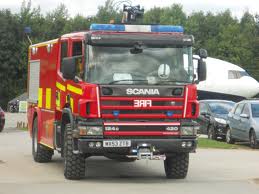
A 'transformational change' between the Scottish Fire and Rescue Service and Scottish Ambulance Service would improve patient outcomes and save lives.
Scotland's Chief Inspector of the SFRS, Steven Torrie, said firefighters could play a vital medical response role in communities across the country, particularly in the quick and effective use of defibrillators to deal with cardiac arrests.
At present, more than half of Scotland's fire appliances are equipped with defibrillators, but these were originally acquired for use in the event that a fire-fighter has a cardiac arrest whilst on duty and are rarely used for other purposes.
With only a few exceptions, SFRS personnel do not respond routinely to calls for help to members of the public who have medical emergencies, a practice that has been adopted by a number of fire services in England and Wales as well as overseas.
A small pilot scheme has been established at Maud and Braemar for a number of years, allowing personnel to respond to medical calls in their station area. The Inspectorate believe these pilots have been successful in demonstrating the ability of SFRS resources to respond to medical emergencies without compromising fire cover in their area. However, there appears to have been no detailed evaluation of the pilots' effectiveness and therefore roll-out wider than the two stations.
In the independent report published today, the HM Fire Service Inspectorate has:
Strongly encouraged the SFRS to consider how its relationship with the SAS can become much closer, and to engage with the Scottish Government and SAS to that end
Called for a transformational change in the relationship between the SFRS and SAS to take place in order to deliver better services to the public
Recommended that SFRS carry out a formal evaluation of the schemes at Maud and Braemar to quantify the costs of setting up and managing those schemes, and the full benefits that the community has obtained from them
Asked SFRS to form an evidence-based view as to whether it will or will not expand the provision of emergency medical response by its staff
Suggested that SFRS sets out a national policy for the distribution and use of defibrillators, and that a database of locations and numbers of trained staff is maintained and shared with the SAS
Commenting on the report, Mr Torrie said:
"This report highlights the tremendous potential that exists for the SFRS to support the SAS and improve co-operation and joint-working in a way that will save lives and improve patient outcomes during time-critical medical emergencies.
"Instead of viewing their respective response activities as separate from each other and requiring only to be co-ordinated at the boundaries, we believe that fire and ambulance services should increasingly see themselves as jointly contributing to attending emergency incidents to provide the best possible outcomes for the public, regardless of the nature of the incident.
"To achieve this will require a transformational change in the way these services work together, and I hope our report will act as a catalyst for action to benefit communities the length and breadth of Scotland.
"We know that SFRS recognises the value of defibrillators, it already owns around 380, around 350 of them which are on appliances and 30 at stations or held as spares. And many firefighters are already trained in enhanced first aid.
"But at the moment there are very few instances where SFRS personnel are turned out routinely and formally to help members of the public who have medical emergencies. This, to me, is a major missed opportunity to help serve communities and save lives.
"Small-scale pilots at Braemar and Maud were established by the former Grampian FRS in partnership with the SAS in 2007, with the Maud scheme in particular being shown to be of great benefit to the local community. Which begs the question as to why the partnership has never progressed beyond the two pilots.
"The ambulance service in Scotland responds as quickly as possible to medical emergencies, including cardiac arrest. Fire-based emergency medical response would not be a substitute for an ambulance service, rather, it should complement and support that service and allow for the delivery of better outcomes to the community.
"That does not mean merging the services or attempting to train all responders as experts in all types of incident. There needs to be specialist intervention by trained paramedics at a medical incident just as there needs to be specialist intervention by trained firefighters at a fire.
"But if fire and rescue service personnel, trained in initial emergency interventions, can attend at medical incidents before the ambulance service is able to get there – and save lives by doing so, then in our view the public would not expect traditional views of what a firefighter does to stand in the way of that."

 10°C
10°C
 10°C
10°C